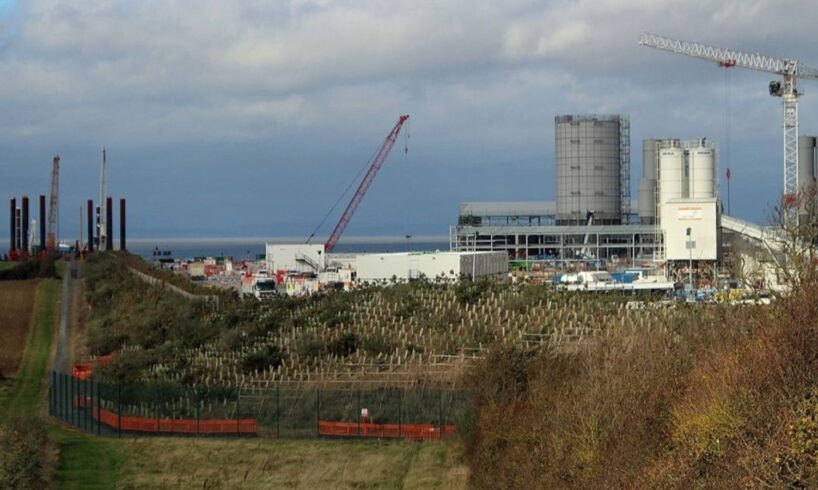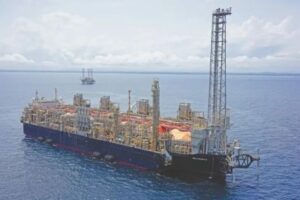
Workers at the under construction Hinkley Point C nuclear plant site in Somerset, south-west England, returned to work Thursday after launching a second unofficial walkout in less than a week.
The wildcat action last Wednesday, followed by the stoppage which started on Tuesday this week, was triggered by workplace bullying by senior management. It has been ended after the removal of one manager from the site, pending an investigation.
Construction work at the Hinkley Point (C) site in 2017 [Photo by Nick Chipchase / CC BY-SA 2.0]
The action involved workers for MEH Alliance—comprising ALTRAD Services, Cavendish Nuclear, Balfour Beatty, NG Bailey and ALTRAD Babcock—one of the main group of contractors building the plant. Hinkley Point C is being developed by French state-owned energy giant EDF, under commission from the British government, and employs approximately 12,000 workers directly.
The Guardian reported, “It was the second unofficial strike to take place in a week after a walkout last Wednesday in defiance of union reps and the site developer, French utility company EDF, following claims that senior managers on the Hinkley site have bullied engineering staff.”
The New Civil Engineer website referred to local news sources quoting a worker who took part saying that between 3,000-4,000 workers were involved. It observed, “EDF and Unite the union which represents many workers at the plant, sought to downplay the significance of the strike, which was organised outside of the formal process for organising strikes.”
Unite and the GMB, the two main recognised trade unions on the site, have not even produced a press release. An unidentified Unite spokesperson told the media, “Unite expects this matter to be resolved soon”—effectively signalling its agreement with EDF that the dispute should be shut down through grievance procedures which have demonstrably failed to protect workers.
A spokesperson for Hinkley Point C boosted its partnership with union officials, branding the action by workers as the work of a minority, saying, “We join with our trades union partners in asking that the correct process is followed to resolve any grievance. Normal working throughout the site has been unaffected by this unofficial action.”
Somerset Live reported that workers were “furious” at the lack of union backing.
Management bullying is symptomatic of the manifold problems confronting workers at Hinkley Point C. The construction site, reportedly the largest in Europe, exemplifies the brutal conditions and corporate indifference prevailing at workplaces across Britain and internationally.
In April, workers complained that the site was “overrun by rats,” especially around the canteens. One told The Observer, “They’re all over. You see them just sat there, looking at you… They are everywhere now.”
EDF acknowledged the vermin problem but, as always, stressed its commitment to working “alongside our trades union partners”. The newspaper reported the trade unions had “broached the issue with EDF” while ending the article by stating that Unite and the GMB “declined to comment.”
As well as workers health being placed in jeopardy, there are fatal consequences to the violations of health and safety. Earlier this month, the Office for Nuclear Regulation confirmed that three major contractors face prosecution for health and safety offences over the death of 48-year-old Jason Waring, a site supervisor who died from a “crush injury”—according to ITVX—involving a piece of mobile plant on November 13, 2022. Waring was employed by Bylor, a joint venture between Bouygues Travaux Publics SAS and Laing O’Rourke Delivery Ltd. Both now face charges, along with NNB Generation Company (HPC) Ltd., the EDF subsidiary overseeing the site.
Corporate interests and state backing
The Hinkley Point C project is a cornerstone of Britain’s energy policy and a multi-billion-pound financial investment for EDF. The French state-owned firm has been guaranteed a fixed price for the electricity eventually generated at the site, to be paid through consumer energy bills. But the estimated profits of between £80-100 billion over the 35-year life span of the contract signed with the government will not be realised until the plant is operational, which is not expected for another five years.
With rising costs calculated to have increased since its contracts were signed in 2016 from £18 billion to £47. 9 billion in today’s terms, EDF is seeking to shore up its profits with its major private contractors constructing the nuclear reactor by shifting the burden onto the backs of workers. This means a constant drive to cut corners on safety, hygiene and maintaining an oppressive workplace regime.
The downward squeeze on workers has also been impacted by the ratcheting up of tensions with China, which has increased the financial pressure on the project. EDF’s partner, state owned China General Nuclear Power Group (CGN), signalled it will not invest more funding beyond its contracted term in 2023. In late 2022, the UK government moved to exclude CGN from the project to build another nuclear plant ,Sizewell C in the east of England, citing “national security.”
The combination of warmongering and the constant drive for profit accounts for the two unions’ refusal to even back the action taken by workers. To acknowledge and endorse an unofficial strike would threaten their corporatist partnership with the Labour government and the employers. The union bureaucracy will not oppose management intimidation, safety violations or health hazards, because their privileged positions depend on suppressing rank-and-file resistance.
The way forward: A rank-and-file committee
The walkouts at Hinkley Point C shows how workers can begin to fightback collectively, proving that the precondition is overriding the restrictions placed upon them by the union apparatus. Without workers taking action on their own initiative, there would have been no fightback against EDF.
But a single manager being removed from the site and an investigation controlled by EDF will not resolve the problem of workers being mistreated and the abuses they face. The source of this lies with the constant ratcheting up of their exploitation in collusion with the union bureaucracy. If the opposition remains at the level of spontaneous walkouts, this will be isolated and worn down by management and the trade union leaders who operate as a single corporatist entity.
A rank-and-file committee, independent of the pro-corporate trade unions, must be formed committed to democratic principles, transparency, and direct control by the workers themselves. Such a committee can fight for:
The full investigation and immediate removal of all managers responsible for bullying and harassment.
Protection of all workers from victimisation or disciplinary measures following the strike and reimbursement of wages lost through the unofficial action
Safe working conditions, including immediate action on site hygiene and pest control
Full accountability for workplace injuries and a worker-led investigation into circumstances of the death of Jason Waring
An end to the gagging of workers’ voices by union officials and site management.
This committee should link up with workers at other sites and industries confronting similar abuses—reaching out to Royal Mail postal workers resisting restructuring, to National Health Service staff battling underfunding and privatisation, and to the 400 Birmingham bin workers to end the isolation of their the seventh month struggle to prevent the destruction of their jobs and drastic wage cuts by a strike breaking operation led by the Starmer government.
Through the building of a national and international network of rank-and-file committees, the working class can fight back effectively against the relentless assault on wages, conditions and democratic rights. This is the perspective advanced by the International Workers Alliance of Rank-and-File Committees (IWA-RFC).
The WSWS encourages workers at Hinkley Point C to send in reports of their struggle, presently kept under wraps by the union bureaucracy, which can be published anonymously. See the form below.
Make your voice heard! Tell us about conditions in your workplace. All submissions will be kept anonymous.





